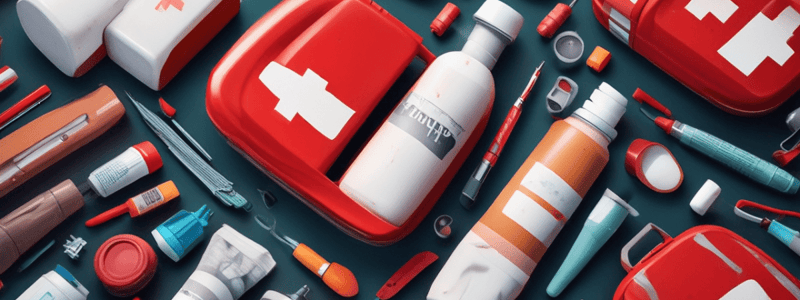Podcast
Questions and Answers
What should you do if a conscious diabetic patient is experiencing an emergency?
What should you do if a conscious diabetic patient is experiencing an emergency?
- Give food or liquids
- Maintain an open airway
- Place the patient in the recovery position
- Administer sugar, glucose, or juice (correct)
Which of the following is NOT a typical sign or symptom of a diabetic emergency?
Which of the following is NOT a typical sign or symptom of a diabetic emergency?
- Agitated or combative behavior
- Cool/Clammy skin
- Facial droop (correct)
- Sweet smell to breath/perspiration
What action should be taken for an unconscious diabetic patient?
What action should be taken for an unconscious diabetic patient?
- Give food or liquids
- Maintain an open airway
- Place the patient in the recovery position (correct)
- Administer sugar or glucose
What is a common challenge when differentiating between a diabetic emergency and alcohol intoxication?
What is a common challenge when differentiating between a diabetic emergency and alcohol intoxication?
Which sign or symptom is characteristic of strokes but not typically seen in diabetic emergencies?
Which sign or symptom is characteristic of strokes but not typically seen in diabetic emergencies?
In the case of a stroke or Transient Ischemic Attack (TIA), what is recommended for maintaining patient positioning?
In the case of a stroke or Transient Ischemic Attack (TIA), what is recommended for maintaining patient positioning?
What is the first step in treating thermal burns according to the lesson?
What is the first step in treating thermal burns according to the lesson?
What type of burn requires evaluating for entry and exit wounds?
What type of burn requires evaluating for entry and exit wounds?
Which of the following statements about shock is true according to the information provided?
Which of the following statements about shock is true according to the information provided?
What is the recommended treatment for chemical burns involving dry substances?
What is the recommended treatment for chemical burns involving dry substances?
According to the information provided, what is the primary issue in a state of shock?
According to the information provided, what is the primary issue in a state of shock?
What should you NOT do during childbirth?
What should you NOT do during childbirth?
Which of the following is NOT listed as a potential complication during childbirth?
Which of the following is NOT listed as a potential complication during childbirth?
What should you do if the placenta delivers during childbirth?
What should you do if the placenta delivers during childbirth?
Which of the following communicable diseases is NOT mentioned in the text?
Which of the following communicable diseases is NOT mentioned in the text?
What should you do if the baby is not breathing after delivery?
What should you do if the baby is not breathing after delivery?
What should you do if the baby's cord prolapses during delivery?
What should you do if the baby's cord prolapses during delivery?
What is the primary emergency concern in overdose emergencies?
What is the primary emergency concern in overdose emergencies?
What should be considered if a patient is unconscious and there is a known or suspected opioid overdose?
What should be considered if a patient is unconscious and there is a known or suspected opioid overdose?
Which medication is often sourced from veterinary clinics and can lead to overdose emergencies?
Which medication is often sourced from veterinary clinics and can lead to overdose emergencies?
What is a potential effect of opioid overdose that necessitates monitoring the patient's level of consciousness?
What is a potential effect of opioid overdose that necessitates monitoring the patient's level of consciousness?
In overdose emergencies, what position should be used for an unconscious patient?
In overdose emergencies, what position should be used for an unconscious patient?
What should be obtained regarding a conscious patient who overdosed on medications or drugs?
What should be obtained regarding a conscious patient who overdosed on medications or drugs?
Which of the following is NOT a universal precaution measure?
Which of the following is NOT a universal precaution measure?
In the case of a heat-related illness, which of the following is NOT a recommended action?
In the case of a heat-related illness, which of the following is NOT a recommended action?
When dealing with a cold-related illness, which of the following actions should be taken first?
When dealing with a cold-related illness, which of the following actions should be taken first?
What is the priority one consideration in an overdose emergency?
What is the priority one consideration in an overdose emergency?
According to the information provided, when should an unconscious victim be considered dead in a cold-related illness situation?
According to the information provided, when should an unconscious victim be considered dead in a cold-related illness situation?
Flashcards
Treating a conscious diabetic emergency
Treating a conscious diabetic emergency
Administering a source of sugar, like glucose tablets or sugary drinks, to a conscious patient experiencing low blood sugar.
Recognizing diabetic emergency signs
Recognizing diabetic emergency signs
Confusion, sweating, or shakiness are common signs of diabetic emergencies. An unclear mental status alone doesn't always indicate a diabetic emergency.
Responding to an unconscious diabetic patient
Responding to an unconscious diabetic patient
Do not give oral sugar to an unconscious diabetic patient; seek immediate medical attention or use injectable glucagon if available.
Differentiating diabetic emergency from alcohol intoxication
Differentiating diabetic emergency from alcohol intoxication
Signup and view all the flashcards
Distinguishing diabetic emergency from stroke
Distinguishing diabetic emergency from stroke
Signup and view all the flashcards
Positioning a stroke or TIA patient
Positioning a stroke or TIA patient
Signup and view all the flashcards
First step in treating thermal burns
First step in treating thermal burns
Signup and view all the flashcards
Evaluating full-thickness burns
Evaluating full-thickness burns
Signup and view all the flashcards
Understanding shock
Understanding shock
Signup and view all the flashcards
Treating chemical burns with dry substances
Treating chemical burns with dry substances
Signup and view all the flashcards
Safe delivery of baby
Safe delivery of baby
Signup and view all the flashcards
Possible complications during childbirth
Possible complications during childbirth
Signup and view all the flashcards
Handling the placenta after delivery
Handling the placenta after delivery
Signup and view all the flashcards
Resuscitating a baby after delivery
Resuscitating a baby after delivery
Signup and view all the flashcards
Managing a prolapsed umbilical cord
Managing a prolapsed umbilical cord
Signup and view all the flashcards
Primary concern in overdose emergencies
Primary concern in overdose emergencies
Signup and view all the flashcards
Administering naloxone in opioid overdose
Administering naloxone in opioid overdose
Signup and view all the flashcards
Overdose from Buprenorphine
Overdose from Buprenorphine
Signup and view all the flashcards
Monitoring consciousness in opioid overdose
Monitoring consciousness in opioid overdose
Signup and view all the flashcards
Positioning an unconscious patient in overdose
Positioning an unconscious patient in overdose
Signup and view all the flashcards
Collecting information from a conscious overdose patient
Collecting information from a conscious overdose patient
Signup and view all the flashcards
Understanding universal precautions
Understanding universal precautions
Signup and view all the flashcards
Managing heat-related illnesses
Managing heat-related illnesses
Signup and view all the flashcards
Treating cold-related illnesses
Treating cold-related illnesses
Signup and view all the flashcards
Priority in overdose emergencies
Priority in overdose emergencies
Signup and view all the flashcards
Assessing unconsciousness in cold-related illnesses
Assessing unconsciousness in cold-related illnesses
Signup and view all the flashcards
Study Notes
Diabetic Emergency Response
- For a conscious diabetic patient in an emergency, administer a source of sugar, such as glucose tablets or sugary drinks.
- An unclear mental status is usually NOT a typical sign of a diabetic emergency; look for signs like confusion, sweating, or shakiness.
- If a diabetic patient is unconscious, do NOT attempt to give oral sugar; instead, seek immediate medical attention or use an injectable glucagon if available.
- Differentiating between a diabetic emergency and alcohol intoxication can be challenging; both may present confusion, but specific blood sugar testing can clarify the situation.
- One sign characteristic of strokes that is not typically seen in diabetic emergencies is facial drooping.
Stroke & TIA Management
- For a stroke or TIA, keep the patient in a comfortable position, preferably sitting or lying down with the head elevated.
Burn Treatment
- The first step in treating thermal burns is to cool the burn with running water for at least 10 minutes.
- Full-thickness burns require evaluating for entry and exit wounds, particularly in cases involving electrical burns.
Shock and Complications
- A true statement about shock is that it results in inadequate blood flow, which can lead to organ failure.
- For chemical burns with dry substances, brush off the chemical and flush the area with running water afterward.
Childbirth Protocol
- During childbirth, do NOT pull on the baby; allow the body to emerge naturally.
- A potential complication during childbirth that is not commonly listed is anaphylaxis in the mother.
- If the placenta delivers during childbirth, always save it for evaluation by medical personnel.
Baby Resuscitation
- If the baby is not breathing after delivery, provide gentle stimulation and initiate resuscitation measures as needed.
- For a prolapsed umbilical cord during delivery, position the mother to relieve pressure off the cord and seek emergency assistance.
Overdose Emergencies
- The primary emergency concern in overdose situations is respiratory depression or failure.
- If a patient is unconscious with a known or suspected opioid overdose, consider administering naloxone if available.
- Buprenorphine, often found in veterinary clinics, can lead to overdose emergencies in humans.
- Opioid overdose can cause altered mental status, making it critical to monitor the patient’s level of consciousness closely.
- In overdose emergencies, position an unconscious patient on their side to maintain an open airway and reduce choking risk.
Additional Considerations
- Collect relevant information about the conscious patient who has overdosed, including what substances were taken and their dosage.
- Universal precautions do NOT include administering treatment without protective barriers.
- In heat-related illnesses, avoiding exertion is NOT recommended; rest and cooling are encouraged.
- For cold-related illnesses, priority actions include rewarming the person gently and seeking medical help.
- In overdose emergencies, priority one consideration is ensuring airway patency and adequate breathing.
- In cases of cold-related illnesses, an unconscious victim may be presumed dead when there are no signs of life after careful assessment.
Studying That Suits You
Use AI to generate personalized quizzes and flashcards to suit your learning preferences.




